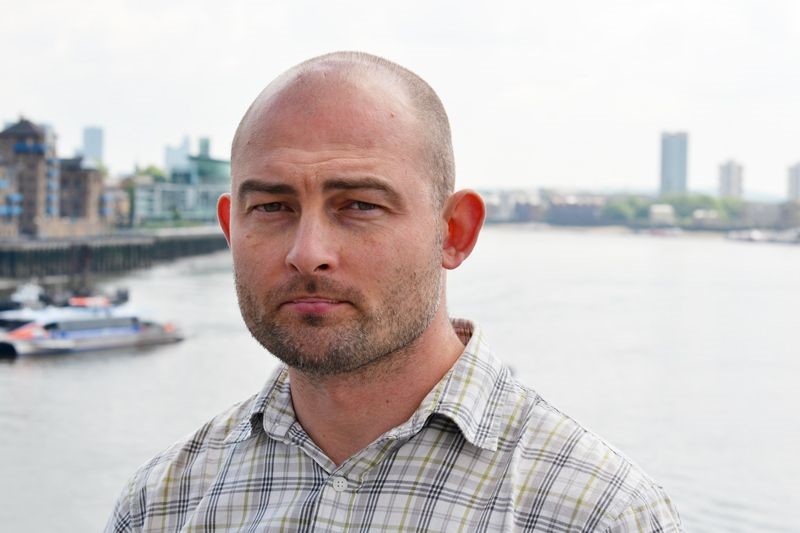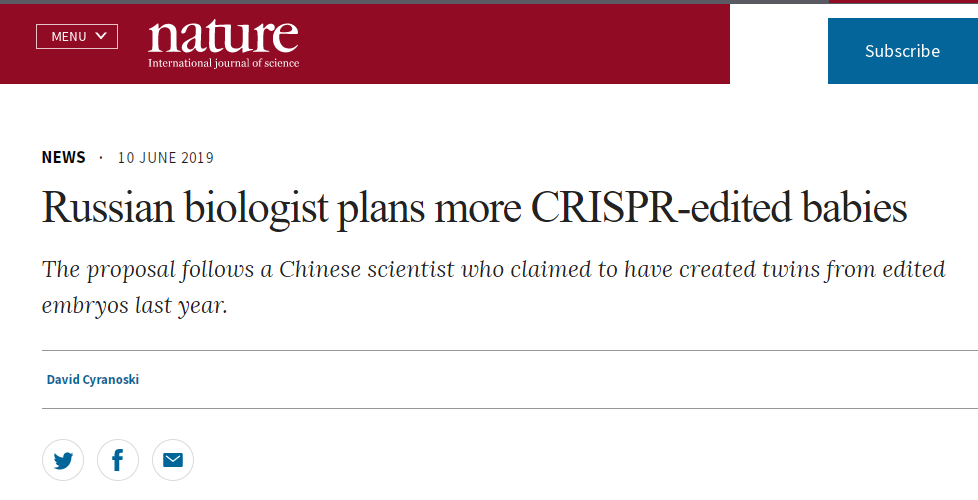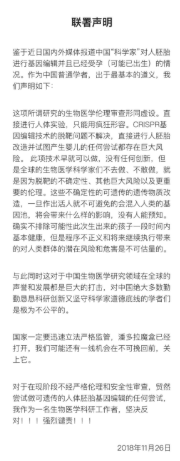Russian scientists plan to continue to make genetically edited babies! Why is the scientific community strongly opposed?
June 13, 2019 Source: Sohu Health
Window._bd_share_config={ "common":{ "bdSnsKey":{ },"bdText":"","bdMini":"2","bdMiniList":false,"bdPic":"","bdStyle":" 0","bdSize":"16"},"share":{ }};with(document)0[(getElementsByTagName('head')[0]||body).appendChild(createElement('script')) .src='http://bdimg.share.baidu.com/static/api/js/share.js?v=89860593.js?cdnversion='+~(-new Date()/36e5)];
(Russian scientist Denis Rebrikov)
According to the "Nature" magazine website reported on June 10, Russian scientist Denis Rebrikov said that he wants to become an improved version of He Jiankui, to carry out the genetic editing baby experiment against AIDS. If the experiment can be endorsed by the relevant Russian authorities before the end of the year, it may be completed before the end of the year. Many experts have called for this practice to run counter to the scientific spirit, and these experiments should be banned until international academic ethics proves that genetically edited infants are reasonable and safe.

Improved version of the gene editing baby experiment
In November last year, Chinese scientist He Jiankui announced the birth of the first genetically edited baby in human history, which caused strong condemnation from scientists all over the world. Eighteen scientists and ethicists from seven countries published a review article in the March issue of Nature, calling for a global halt to the clinical application of all human germline gene editing. The so-called germline gene editing, which changes the heritable DNA (sperm, egg or embryo) to make genetically edited babies.
Although genetically edited babies have been criticized in international public opinion, the Russian molecular biologist Denis Rebrikov still claims that his technique is more beneficial than He Jiankui, can bring less risk, and is more ethically more reasonable. More acceptable to the public.

Denis Rebrikov is the head of the genome editing laboratory at the Kulakov National Obstetrics and Gynecology and Perinatal Medical Research Center, the largest fertility clinic in Russia, and the vice president of the Russian National Pirogov Medical University. Like He Jiankui's previous gene editing target, Denis Rebrikov plans to disable the CCR5 gene, one of the major co-receptors of HIV-invasive somatic cells, modifying the genes in embryos created by fathers carrying HIV, and then embryos. Implant HIV positive mothers to reduce the risk of transmitting the virus to the fetus.
Unlike He Jiankui, Denis Rebrikov plans to recruit mothers who are AIDS patients, not just fathers. But many geneticists believe that this has done nothing, because the risk of the father passing HIV to his children is small.
Seeking official approval for exemption
At present, many countries have explicitly banned the editing of human embryonic genes. According to Nature, Russian law prohibits genetic engineering in most cases, but it is unclear whether these rules will be implemented in embryonic gene editing or how they will be implemented. An analysis of assisted reproductive regulations in several countries in 2017 showed that Russia's regulations on assisted reproduction did not explicitly mention genetic editing.
Denis Rebrikov expects that the Russian Ministry of Health will clarify the clinical rules for embryonic gene editing within the next nine months. Denis Rebrikov said he had a sense of urgency to help HIV-infected women, so he had already tried it before Russia introduced regulations.
In order to avoid being punished for experimentation, Denis Rebrikov plans to first seek approval from three government agencies, including the Russian Ministry of Health, which may take between one month and two years.
Why should you object to genetic editing babies?
At present, the research and application of CRISPR-Cas9 technology is exploding, which fully proves that it will bring about great changes to human society. However, many scientists do not agree with the experiment of genetically edited babies. They have accused not only violating international ethical norms, but also have risks and unknowns far beyond any potential benefits.
In November last year, Bi Guoqiang of the University of Science and Technology of China, Cai Xuyu of West China Hospital of Xichuan University, and Luo Huan of Peking University, and other scientists in the biomedical field issued a joint statement saying that genetically edited babies can only be described as “crazy†and expressed strong opposition and strong condemn.

Many scientists agree that this ostensibly means that genetic editing technology is used for historical breakthroughs in disease prevention, but humans may also pay a higher price.
First of all, CRISPR gene editing technology can edit the genome with high accuracy and precision. However, the uncertainty caused by the off-target problem has always brought about the future life of this gene editing baby. No one can predict what kind of influence. As Jennifer Doudna, co-inventor of CRISPR-Cas9, said, "Technology is not ready yet."
According to a research paper co-authored by the Institute of Neuroscience of the Chinese Academy of Sciences and the Department of Genetics of Stanford University, there are many related basic researches based on CRISPR/Cas9 gene editing technology. In particular, risk assessment requires scientists from all over the world to join hands. Solid progress, far from being able to directly edit the extent to which humans have "genetically edited babies."

The potential risks and hazards of these uncertainties to the human population are immeasurable.
On June 3, an article in the journal Nature Medicine pointed out that by analyzing the genetic database of the United Kingdom, it was found that if a person is born with a genetic similarity to genetically edited infant DNA, then he is at risk of dying before the age of 76. People with characteristics are 21% higher.

Secondly, "gene-editing babies" have an ethical ethic. Trying to modify the genome in human living embryos raises concerns beyond the scope of biology and genetics, which is beyond the bottom line acceptable to most countries. Internationally, people are cautious about genetically editing human embryos, and generally terminate their pregnancy within 14 days of fertilized egg development.
Genetician George Daley of Harvard Medical School in Boston, Massachusetts, said that before any scientist attempts to implant a genetically edited embryo into a woman, a transparent, open debate about scientific feasibility and ethical permissibility must be made.
Liu Ying, a researcher at the Institute of Molecular Medicine at Peking University, also said in an interview that genetically edited children are used as experimental products. These unknown risks will accompany their growth and bring more unforeseen negative effects. "Pandora's box may be It opened up."
To this end, many scientists have once again called for the international suspension of genetic editing in the reproductive system. Although this has not happened, the National Academy of Sciences of the United States, the Royal Society of the United Kingdom, etc. have defined reproductive gene editing as "unnecessary or excessively dangerous use."
Reference material
Https://
Https://futurism.com/the-byte/russian-biologist-more-crispr-edited-babies
Https://
Https://
Hardware Locks,Stainless Steel Plane Locks,Flat Locks,Plane Locks
Ningbo Hengchieh Locking Technology Co., Ltd. , https://www.yh-lock.com